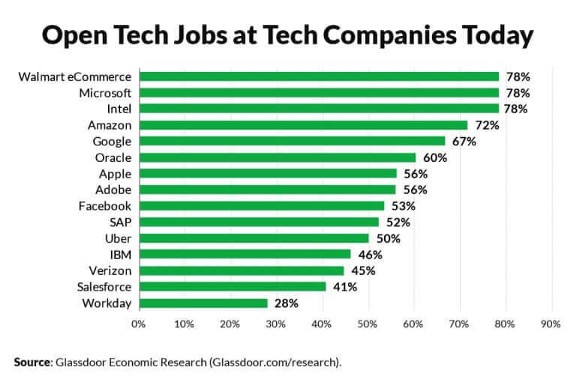Information technology is growing at a tremendous speed. In America, IT jobs are among the most well-paid and in-demand. A recent report from Cisco showed that these computer-related jobs are most important for a company’s success. What’s more, IT jobs are predicted to be among the fastest-growing through 2024. In this article, we’re going to review 10 highest paying IT jobs.
“Demand for tech workers continues to grow at a pace that’s unmatched in other industries,” says Raj Mukherjee, senior vice president of product at job search site Indeed.
Glassdoor broke down the highest-paying IT jobs in the industry, based on average yearly salary. According to the report, the top IT 10 positions include:
- Software engineering manager
- Data warehouse architect
- Software development manager
- Infrastructure architect
- Applications architect
- Software architect
- Technical program manager
- Enterprise architect
- DevOps engineer
- Information security engineer

1. Software engineering manager: $163,500
Software engineering managers employ their technical and managerial skills to oversee cutting-edge software in a high-intensity, metrics-driven environment. Their responsibility is to build, develop, and engage a team of engineers and lead them to effectively and efficiently solve challenging software problems.
Some of the required qualifications include:
- At least 5 years of software engineering work experience.
- At least 5 years of experience in coding in C++, Java, and/or PHP.
- Ability to recruit and manage technical teams.
- Experience in people management.
2. Data warehouse architect: $154,800
Data warehouse architects are responsible for the successful delivery of business intelligence information to the company. This IT position includes maintaining systems for keeping raw data and metadata secure. They might also consider ROI and financial metrics for projects in order to determine best practices and deliver solutions that drive profit.
Data warehouse architects have experience in:
- BI development and implementations
- data architecture
- data warehousing
- programming languages such as Java
3. Software development manager: $153,300
Software development managers are among the highest-paid IT workers who have the responsibility to lead teams of software developers. They lead teams that design software, web applications, and web services. They also hire and train staff, oversee budgets, and deliver reports to senior managers. Moreover, software development managers can also test and debug applications, resolve performance issues, and make revisions when necessary.
Software development managers must have:
- strong technical and analytical skills
- knowledge of computer software languages, platforms, and current methodologies
- strong budgeting, leadership, and managerial abilities
- excellent written and verbal communication skills
4. Infrastructure architect: $153,000
Infrastructure architects hold one of the highest-paying IT jobs in the industry. They design and implement information systems to support the infrastructure of a company. They are responsible for making sure that all systems are working at optimal levels and supporting the development of new technologies. Their role is to enhance design specs, create technical documentation, implement control concepts, and deliver expected outcomes.
Their required skills include:
- Experience in project management.
- Experience with web technologies and building enterprise architecture roadmaps.
- Knowledge of client-server networking and database management.
- Experience designing and managing complex infrastructure solutions.
- Ability to offer technical system solutions.

5. Applications architect: $149,000
Applications architect is another high-paying IT position on the list. This job includes creating new applications within a company and improving existing applications. An application architect can also run software tests, develop product prototypes, and create technical documents relating to application development. Moreover, an application architect can train and manage other team members in programming and software development.
Software development managers must:
- have strong analytical, creative, problem-solving, and critical thinking skills
- provide suggestions and solutions in software development, use, and maintenance
- have strong leadership skills
- Have strong verbal and written communication as well as interpersonal skills
6. Software architect: $145,400
The job description of a software architect includes making high-level design choices and dictating technical standards. They define and decide development technology and platform, identify business requirements, design systems, and check architecture and code. A software architect might also collaborate with other architects and stakeholders, and mentor and consult developers.
Important skills of software architects include:
- Know the basic design patterns.
- Know quality measures.
- Understand different technology stacks.
- Analyze and understand applied patterns.
- The ability to lead a team.
7. Technical program manager: $145,000
A technical program manager is responsible for handling all aspects of technical projects for an organization. They initiate programs, follow their progress, and offer support if issues arise. Moreover, they track technical issues and implement solutions, communicate project status, define strategies, and participate in executive meetings. This IT position also includes reviewing and testing code, providing technical leadership, and making sure projects are completed within budget.
Some of the basic qualifications include:
- Experience with technical project management.
- Strong organizational skills.
- Great communication and collaboration skills.
- Financial and cost management.
- The ability to manage risks.
- Understanding business goals.

8. Enterprise architect: $144,400
The position of an enterprise architect has made to the list of highest-paying IT jobs for 2018. This IT position includes developing the plans and workflows for deploying and maintaining servers, software, and others. An enterprise architect contributes to the IT strategy, participates in activities related to design, development, and maintenance of the Enterprise Architecture, and researches overall ICT solutions on the market for particular technical requirements and business needs.
An enterprise architect needs to have the following skills:
- Relevant technical experience in the ICT field.
- Relevant certification.
- Verbal and written skills.
- Team leadership.
- Good marketing skills.
- Great analytical and design skills.
- Experience in developing and building models based on The Enterprise Framework.
9. DevOps engineer: $137,400
A DevOps engineer alters and improves the relationship between development and IT operations, and advocates better communication and collaboration between the two units. They deploy updates and fixes, build tools to reduce occurrences of errors, and develop software to integrate with internal back-end systems. Their job might also include investigating and resolving technical issues and developing scripts to automate visualization.
Important skills of DevOps engineers include:
- Experience as a DevOps Engineer or similar software engineering job.
- Knowledge of Python or Ruby.
- Knowledge of databases and SQL.
- Problem-solving skills.
- Team player.
10. Information security engineer: $131,300
The job responsibility of an information security engineer includes protecting the company’s data and other assets from hacking or other malicious acts. An information security engineer strengthens encryption and works to close any security gaps in the company’s infrastructure.
Their required skills include:
- Experience with anti-virus software, firewalls, and intrusion detection.
- Knowledge of risk assessment technologies.
- Experience in designing secure networks and systems.
- Knowledge of disaster recovery, computer forensic tools.
- Experience developing security policies and standards.









